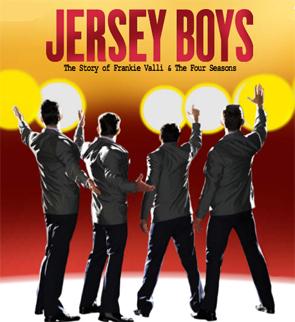There’s a whole bunch of reasons why “Jersey Boys,” the show biz bio-musical of one of the most successful pop-rock groups ever, is still running strong on the road after opening on Broadway in 2005.
For one thing, as non-stop entertainment, the show just plain delivers, unless you listen to nothing but chamber music and prefer your drama to be flavored by Ionesco. You have to have a heart of stone not to be affected by the tale of the Four Seasons, a pop-rock group fronted by rangy singer Frankie Valli who churned out hit after memorable hit in the 1960s and beyond. Give a listen to “Sherri,” “Big Girls Don’t Cry,” “Oh What a Night,” “Walk like a Man” and two incomparable love songs “My Eyes Adore You” and “Can’t Take My Eyes off You,” among dozens of other hits.
If the Beatles, the Rolling Stones and the Beach Boys were the dominant groups of the period of the mid-sixties through early seventies, Frankie and the boys were right behind them if not right up there with them. And they had their own special flavor, and their own story to tell, and it was a story about the boys from the neighborhood, specifically urban and suburban New Jersey, where the mob and the church held sway as role figures.
New Jersey and the mob, wise guys, priests and lounge singers, are of course strong in the imagination of the American public from the films of Martin Scorcese and Francis Ford Coppolla, to “The Sopranos,” to the current “Boardwalk Empire” and, God help us, to the annals of Snookie and The Situation.
“Jersey Boys” is almost a classic rags-jail-time-to-riches story of the kind Hollywood used to deliver routinely, starting off with the founder and eventual destroyer of the group Tommy DiVito (a sharp turn by John Gardiner), who, between jail stints, stubbornly kept trying to put together a group that would take him and his friends out of the neighborhood.
That didn’t happen until he found the angel-voiced Frankie Castelluccio, soon to become Frankie Valli (not with a y), and then later, Bob Gaudio, a teenaged one-hit wonder composer (“Who Wears Short Shorts?”), who would provide the group with all of its string of hits.
Those hits were not generic rock and roll songs in the strictest sense of the word: they were pop songs created at a very high level, which is probably why you can see so many mouths lip-synching, whispering the lyrics in the audience. The songs have staying power every bit as strong as pop ballads from the Great American Songbook.
The music and the storybook merge together in this show which has a snazzy but sparse set, authentic clothes and tough talk from the era(s) it covers. You hear doo-wop music from the early sixties of the kind practiced by rock-star-wannabes, you hear a girl’s group called the Angels sing the thoroughly familiar “My Boyfriend’s Back,” but mostly you hear the playbook of Frankie Valli and the Four Seasons.
And this group, the guys on stage at the National Theater, give off a vivid illusion of at least sounding maybe better than the originals, at least if all you know of the originals in performance mode are the scratchy offerings on YouTube. As rock and rollers, the Seasons are no Stones or even Beatles, although the guitar playing every now and then breaks off into some wild riffs. What Valli and Guido, the true creative forces behind the group, created was a unique sound, pitched by Valli’s high, high and higher notes, and then pulled together into harmonies that sweep over the audience like the kind of surf the Beach Boys rode in on.
Valli, in this show as well as in previous visits to D.C., is performed by Joseph Leo Bwarie – diminutive, with big, pitch-dark eyes and a voice to match Valli’s as well as a tangible stage presence as an actor. He doesn’t have Valli’s harder, masculine, handsome look but you could see why girls might swoon and want to mother and smother him. Those high notes, sweeping out of nowhere, put the soprano in “The Sopranos.”
The group’s story was of course full of strife, drama, hysterics, betrayals and jealousy, like any normal marriage of four guys with egos and talent. DiVito, never far from the wise guys, runs up a huge gambling debt (not to mention a tax lien), which Valli and the group decides to cover. Marriages fail, and Valli loses his talented daughter to drug addiction and overdose at 22. Things happen, and the fact that these guys are from Jersey, which is not quite heartland America but full of tough guys, tough love and heart, makes the show as affecting as the music alone.
At one point, one wise guy asks the guy holding the gambling debt, “Why aren’t these guys dead yet?” He says, “Well, we really like their music.”
Me too. And so will you.
(“Jersey Boys” runs at the National Theater through Jan. 7, 2012.)


